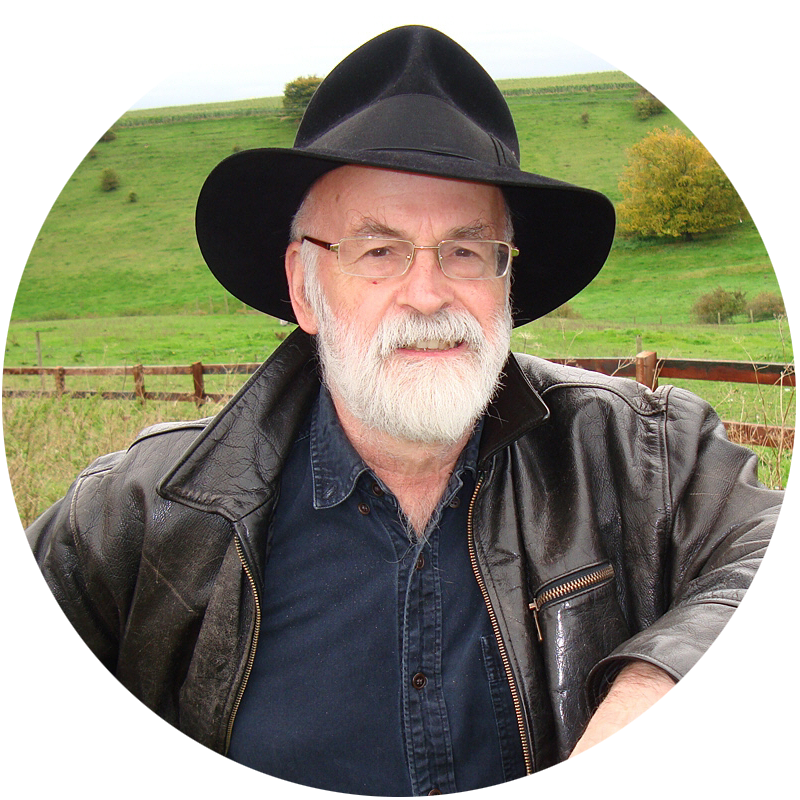
The timeline below chronicles the extraordinary life of Sir Terry Pratchett, from his birth and the publication of his first story in the school paper, to finishing off the final Discworld novel, The Shepherd’s Crown, in 2015.
Terry Pratchett was born in 1948 and had his first story published when he was just thirteen. After leaving school at seventeen to become a journalist he continued writing, publishing his first novel, The Carpet People, in 1971 and going on to produce the phenomenally successful Discworld series. Terry proved early critics wrong and became one of the UK’s most successful authors, receiving a knighthood in 2009 and seeing many of his books adapted for the screen.
He died in March 2015 after a long struggle with Alzheimer’s disease. You can find out more about his life and work below.
Aged thirteen, Terry published his first story, Business Rivals, in school magazine The Technical Cygnet. It was published commercially as The Hades Business the following year. Terry used the fee of £14 to buy his first typewriter.
While studying for his A Levels, Terry decided to leave school to take up a job on local newspaper The Bucks Free Press. As part of his new job he wrote a weekly Children’s Circle story column – some of these stories have now been published in Dragons at Crumbling Castle.

Terry interviewed a local publisher, Peter Bander van Duren, for The Bucks Free Press and happened to mention a book he was working on… Peter passed the manuscript on to his co-director, Colin Smythe. The manuscript in question was The Carpet People, Terry’s first novel, and so began a lifelong friendship, as Colin became Terry’s publisher and later his agent.
This was an important year for Terry – he married his wife, Lyn.

The Carpet People was published, marked by a launch party in the carpet department of Heal’s on Tottenham Court Road. Terry was still only 23.
Terry’s daughter Rhianna was born.
Three Mile Island nuclear disaster in the USA. A few months later, after stints at the Western Daily Press and the Bath Evening Chronicle, Terry moved out of journalism to become press officer for four nuclear power stations with the Central Electricity Generating Board.
He cited this as an example of his unerring sense of timing.

Terry’s first Discworld novel, The Colour of Magic, was published by Colin Smythe – the start of what would become a phenomenally successful series, 41 books strong and translated all over the world.
Transworld Publishers, a division of Penguin Random House, bought the paperback rights and have published the Discworld paperbacks ever since. Gollancz took on the Discworld hardbacks in 1987 – Terry was their first fantasy author – and continued to publish them until 1998, when Transworld took over the entire list.
Equal Rites, an early Discworld novel which tapped into emerging ideas about feminism, was serialised for radio on Woman’s Hour. It was the most popular book they had ever broadcast.
With the Discworld series becoming more and more successful, Terry was gave up his job at the Electricity Board to become a full-time writer.
The Times reported that Terry Pratchett was now the bestselling author in the UK.
Terry was appointed OBE in the Queen’s Birthday Honours List. Despite initially suspecting it was an elaborate hoax, he did turn up to accept the award.

Terry won the Carnegie Medal for his children’s book The Amazing Maurice and His Educated Rodents. Despite the many other awards, honorary degrees and knighthood that followed, he always said that this was the award he was most proud of.

Terry was diagnosed with a rare form of Alzheimer’s, Posterior Cortical Atrophy. He decided to tell the world, and began his campaign to raise awareness of the disease, donating a million dollars to Alzheimer’s research the following year.

Terry was knighted by the Queen for services to literature, although he maintained that his greatest service to literature was to avoid writing any.
Terry delivered the annual Dimbleby Lecture on BBC1, with the help of his friend Tony Robinson, who read his speech for him. In a piece entitled Shaking Hands With Death, Terry was candid about his struggle with Alzheimer’s and his campaign to reform the law on assisted dying. The lecture attracted a record TV audience, the highest there had ever been for a Dimbleby Lecture.
Terry presented a documentary on assisted dying, Terry Pratchett: Choosing to Die, in which he travelled to Switzerland to witness the death of terminally ill motor neurone sufferer Peter Smedley at the Dignitas clinic. The documentary won both a BAFTA and an Emmy.

Despite the progress of his disease, Terry remained busy. In 2013 he published several books: 40th Discworld novel Raising Steam, science fiction novel The Long War in collaboration with Stephen Baxter, The Science of Discworld IV with Ian Stewart and Jack Cohen, and Dodger’s London.
Terry died peacefully at home in Wiltshire, with his family around him and his pet cat asleep on his bed. He had finished one final Discworld novel, The Shepherd’s Crown, a few months earlier which was published posthumously.
Some discworld fans have refrained from reading his final novel in order to keep an unread book from Terry on the shelf.
'Terry Pratchett's writing led me to not accept simple answers, there is always more going on and different perspectives to consider.'
All images on this page are copyright Penguin Random House except the following images: